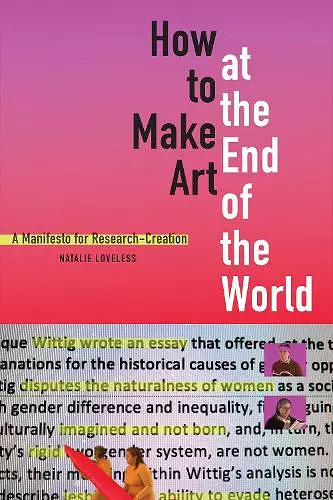How to Make Art at the End of the World
A Manifesto for Research-Creation
Format:Hardback
Publisher:Duke University Press
Published:9th Aug '19
Currently unavailable, and unfortunately no date known when it will be back
This hardback is available in another edition too:
- Paperback£19.99(9781478004028)

In recent years, the rise of research-creation—a scholarly activity that considers art practices as research methods in their own right—has emerged from the organic convergences of the arts and interdisciplinary humanities, and it has been fostered by universities wishing to enhance their public profiles. In How to Make Art at the End of the World Natalie Loveless draws on diverse perspectives—from feminist science studies to psychoanalytic theory, as well as her own experience advising undergraduate and graduate students—to argue for research-creation as both a means to produce innovative scholarship and a way to transform pedagogy and research within the contemporary neoliberal university. Championing experimental, artistically driven methods of teaching, researching, and publication, research-creation works to render daily life in the academy more pedagogically, politically, and affectively sustainable, as well as more responsive to issues of social and ecological justice.
“In this beautifully argued, eminently readable book, stories are the center of attention. Morphing art and knowledge in the neoliberal university situates thinking and pedagogy. Curiosity-driven transdisciplinary practice is both motor and object of analysis. Natalie Loveless asks how stories craft worlds in politically and sensually attuned modes. I treasure the extensive knowledge of modernist performance art and art activism broadly, as well as rich semiotic and psychoanalytic readings of stories and performance. This book is itself a loving act of research-creation.” -- Donna J. Haraway, author of * Staying with the Trouble: Making Kin in the Chthulucene *
“In her evocative book How to Make Art at the End of the World, Natalie Loveless has captured the most urgent and far-reaching question concerning our cultural environment, that is, how to inhabit it in an era of geopolitical uncertainty. This is a daunting task; her ambitious answer, grounded in examples of alternative critical pedagogies, aims to reduce the toxic colonial footprint in arts education by developing a sustainable research-creation model based on differential multiplicities. And that gives us hope.” -- Mary Kelly, Judge Widney Professor, USC Roski School of Art and Design
“In this succinct book, Natalie Loveless explores the claim that art-making practices are well situated to challenge and change existing knowledge-making practices in the contemporary research university…. Her primary audience, researchers in art and fine art, will find the manifesto gives a sophisticated form to an emerging desire—an eros and 'attunement'—to not just study the world, but to have an impact on it.” -- David Theodore * RACAR *
“A necessary read for artists and scholars who are drawn to, or already working with, artistically driven methods of teaching and researching.... Through the text, readers will gain a deeper understanding of how research-creation, beyond doing artistic research, is about creatively intervening in feminist and anti-racist research practices.”
-- Jo Billows and Stephanie Springgay * Journal for Artistic Research *ISBN: 9781478003724
Dimensions: unknown
Weight: 408g
176 pages